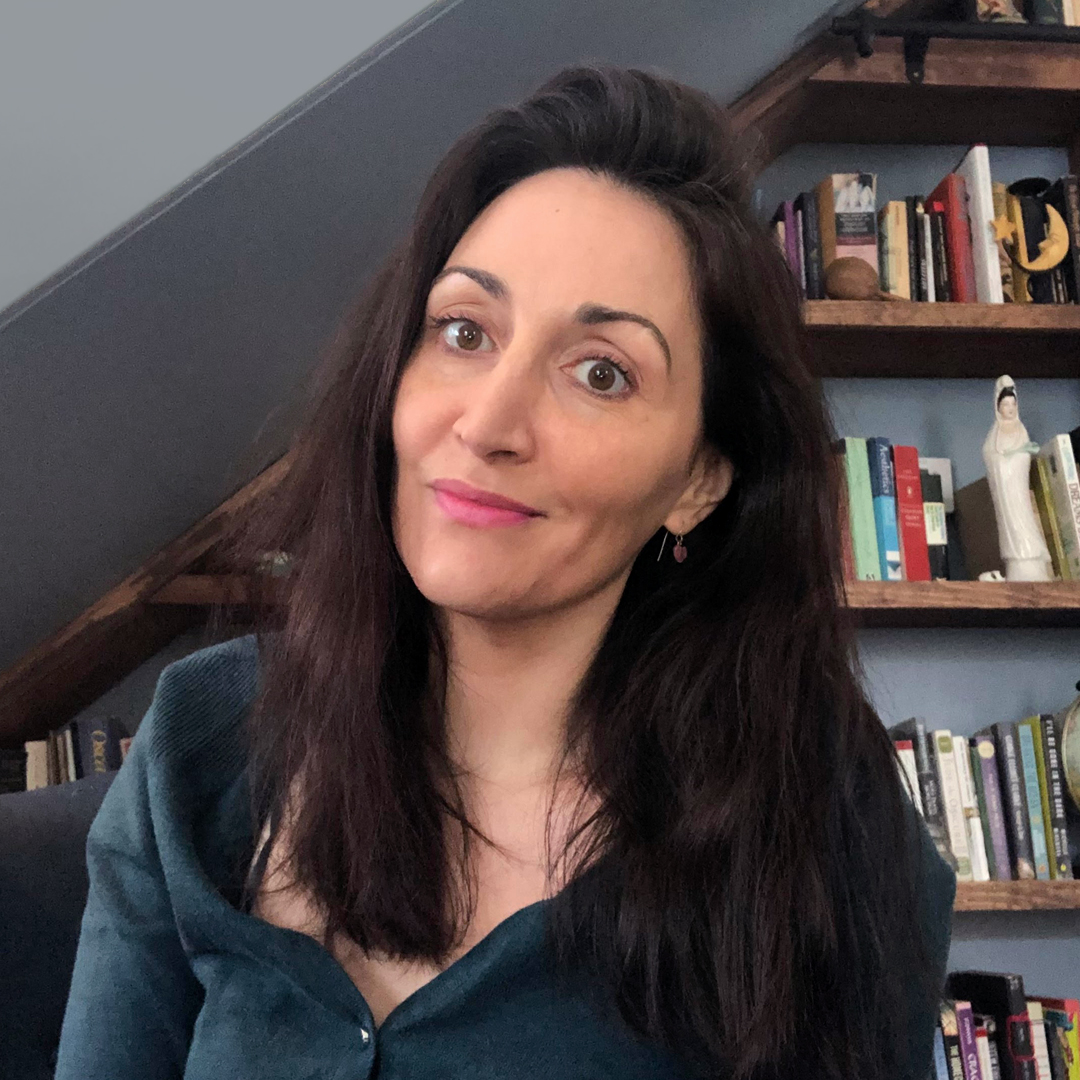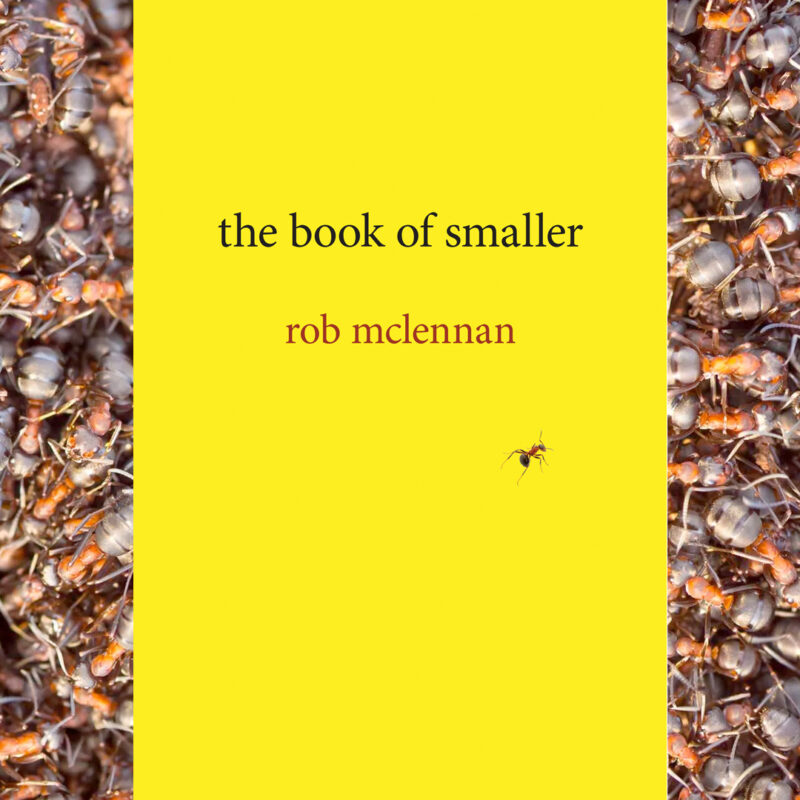USEREVIEW 103: Prolong, in Fragments
In this traditional review, Hollay Ghadery gets out the microscope to peer closely at rob mclennan’s latest poetry collection the book of smaller (University of Calgary Press, 2022).
ISBN 978-1-77385-261-4 | 120 pp | $19.99 CAD — BUY Here
#CAROUSELreviews
#USEREVIEWEDNESDAY
rob mclennan’s newest poetry collection, the book of smaller, is an impressive exercise in compression. Like so many of my favourite poets, mclennan excels at distilling sentiment into something, if not more pure, at least more extraordinary. In their minimalism, each line of mclennan’s short poems offers syntactic revolution, urging us to open our eyes to new possibilities in the minutest of everyday moments, moments where “Memories, / sparrow. The way a thought might give birth” (‘My 1980’).
Memories bursting forth like birds from a tree; the explosive birth of thoughts — these astonishing images unmoor syntax and the way meaning is conveyed. Instead of going for more common phrasing (e.g. “memories dart like sparrows”), mclennan opts for a snappier, more impactful delivery. Combine this approach with the fact that these poems are rooted in the comparatively unexplored realm of the male domestic and you have a collection that intrigued me stylistically as well as personally.
The back cover copy lets us know that mclennan wrote this book while at home full-time with his two young daughters. As a mother of four young children, it was refreshing to witness a father give words to the familiar heft of domestic ritual:
Children sketch. Disarticulate. Endless paper and crayons. They
laugh, pattern, in stick-figure time. To parent, where gravity is
strongest. A lightness of offspring. A weight, sometimes. Simple
wear. Become our own parents. Cyclical. Curve, in the shape of
reckless exhaustion. Curve to the floor. (‘It’s still winter’)
The moments described here are as slow as they are inevitable, as exquisite as they are excruciating. This is a reality of parenthood that I’m sure many parents can relate to, and a scene many of us would like to share with the well-meaning but tedious people at grocery stores and parks and pharmacies, who coo at our babies and tell us to “enjoy every moment.” Like we’re not trying to do just that.
Like we’re not trying to soak in every precious second without letting the mundane repetitiveness of it all drown us. As mclennan so beautifully writes in ‘Sustenance’: “The days prolong, in fragments.”
This simultaneous drag and shattering of time is a near-universal parenting paradox.
In fact, what’s described in many of mclennan’s poems are scenes that will — with all their fractures — conjure complete pictures. In the first of multiple pieces titled ‘Journal Entry,’ we witness an exceptional example of how the poems, tiny as they are, dawdle, toddler-like; how they pause to uncover the mechanisms of moments:
We wake. Ablutions. Coffee. Change, feed, and dress
the children. Newspaper. Christine leaves for work. Baby and I
deposit her sister at preschool. The baby cranks, fusses. We make
do. She naps in the stroller. Time is a factor. We pause. I take my
first breath. These remarkable birds. I sketch out a poem. Once
home. But, the clouds. I dream of short fiction. Today’s postman,
rings. The sentence dissolves. The baby squawks, happily.
Wakeful. A human, being.
In these poems, mclennan gives us life, as we live it. Reading his work, I’m also struck by the sense that in all this compression, there is an insinuated space held for listening. The seeming disconnection between words and ideas mimics the staccato thoughts of someone who’s constantly having their stream of consciousness diverted. Interrupted. By the small, constant demands of the day. Demands and voices we must pause to listen to.
This, I understand.
It took me fifty minutes to write those five sentences. I was interrupted multiple times by cries for help: zippers needed to be unstuck. A toilet unclogged. A rubber boot located. A chicken put back in its run. In these small, everyday actions is a whole life: “A human, being.”
Interestingly and imperatively, mclennan doesn’t express any frustration toward this incessant abbreviation of thought — a feeling that I think would be natural, but, within the confines of this work, would also detract from the grandness of what mclennan ultimately achieves. Rather, his poems suggest a love-heavy acceptance. In ‘The ends of maternity leave,’ he speaks of trying to write until his daughter wakes from her nap, when he must, “Attend again. This whole space.” It is a space that is complete, even as it’s being constantly divided. These increments are what form the totality of our lives.
Moving out of the realm of the domestic, mclennan’s poems also sprawl into more overtly political territory. More political, but still framed within a personal experience. From one of my favourite pieces in the collection, ‘A Confederate General in Charlottesville, Virginia,’:
Where does the world end, and people begin? I can’t look at
this now. As we shift, so too, our lens. An obelisk of uncommon
shape. Why does this matter? We can’t pretend this is all past
tense. Privilege: the luxury to ignore. When so many can’t.
Using the punch of truncated thoughts, mclennan teases out questions of humanity and justice. The poem starts by questioning our relationship with our world, then abruptly — pivotally — abandons this morally centring question to hone back in on the immediate. The task at hand. What must be done to make it through one moment, to the next. But as with the domestically centred poems, it’s the small, precise weight of each thought that cracks open new meaning: like tapping an egg on the side of a bowl, substance pours out. The speaker of this poem is living in one time, one moment, but also acknowledging temporal fluidity: “we can’t pretend this is all past / tense.” Just as the present is a reflection of the past, the world is a reflection of the people in it.
So much scope, in so little space: this is a chief triumph of mclennan’s collection. His ability to compress meaning makes his lines pop, makes his poems as addictive as bubble wrap. In the book of smaller, mclennan masterfully reimagines syntax, gifting words new weight while altering expectations to open our minds to truths that are ultimately, much bigger: a world of “sense,” he writes, “reduced to a letter” (‘Study of an April rain’).


